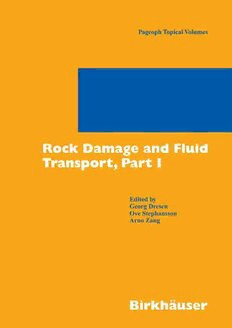Download Rock Damage and Fluid Transport, Part I (Pageoph Topical Volumes) (Pt. 1) PDF Free - Full Version
Download Rock Damage and Fluid Transport, Part I (Pageoph Topical Volumes) (Pt. 1) by Georg Dresen, Ove Stephansson, Arno Zang in PDF format completely FREE. No registration required, no payment needed. Get instant access to this valuable resource on PDFdrive.to!
About Rock Damage and Fluid Transport, Part I (Pageoph Topical Volumes) (Pt. 1)
Mechanical properties and fluid transport in rocks are intimately linked as deformation of a solid rock matrix immediately affects the pore space and permeability. This may result in transient or permanent changes of pore pressures and effective pressures causing rock strength to vary in space and time. Fluid circulation and deformation processes in crustal rocks are coupled, producing significant complexity of mechanical and fluid transport behavior. This often poses severe technical and economic problems for reservoir and geotechnical engineering projects involved in oil and gas production, CO2 sequestration, mining and underground waste disposal. For example, the depletion of hydrocarbon and water reservoirs leading to compaction may have adverse effects on well production. Solution/precipitation processes modify porosity and affect permeability of aquifers and reservoir rocks. Fracture damage from underground excavation will critically influence the long-term stability and performance of waste storage. Part I of this topical volume covers mainly the nucleation and evolution of crack damage in rocks, new or modified techniques to measure rock fracture toughness and a discussion of upscaling techniques relating mechanical and fluid transport behaviour in rocks at different spatial scales. Part II, to be published later in 2006, will include studies investigating the coupling of rock deformation and fluid flow.
Detailed Information
| Author: | Georg Dresen, Ove Stephansson, Arno Zang |
|---|---|
| Publication Year: | 2006 |
| ISBN: | 9783764377120 |
| Pages: | 275 |
| Language: | English |
| File Size: | 5.136 |
| Format: | |
| Price: | FREE |
Safe & Secure Download - No registration required
Why Choose PDFdrive for Your Free Rock Damage and Fluid Transport, Part I (Pageoph Topical Volumes) (Pt. 1) Download?
- 100% Free: No hidden fees or subscriptions required for one book every day.
- No Registration: Immediate access is available without creating accounts for one book every day.
- Safe and Secure: Clean downloads without malware or viruses
- Multiple Formats: PDF, MOBI, Mpub,... optimized for all devices
- Educational Resource: Supporting knowledge sharing and learning
Frequently Asked Questions
Is it really free to download Rock Damage and Fluid Transport, Part I (Pageoph Topical Volumes) (Pt. 1) PDF?
Yes, on https://PDFdrive.to you can download Rock Damage and Fluid Transport, Part I (Pageoph Topical Volumes) (Pt. 1) by Georg Dresen, Ove Stephansson, Arno Zang completely free. We don't require any payment, subscription, or registration to access this PDF file. For 3 books every day.
How can I read Rock Damage and Fluid Transport, Part I (Pageoph Topical Volumes) (Pt. 1) on my mobile device?
After downloading Rock Damage and Fluid Transport, Part I (Pageoph Topical Volumes) (Pt. 1) PDF, you can open it with any PDF reader app on your phone or tablet. We recommend using Adobe Acrobat Reader, Apple Books, or Google Play Books for the best reading experience.
Is this the full version of Rock Damage and Fluid Transport, Part I (Pageoph Topical Volumes) (Pt. 1)?
Yes, this is the complete PDF version of Rock Damage and Fluid Transport, Part I (Pageoph Topical Volumes) (Pt. 1) by Georg Dresen, Ove Stephansson, Arno Zang. You will be able to read the entire content as in the printed version without missing any pages.
Is it legal to download Rock Damage and Fluid Transport, Part I (Pageoph Topical Volumes) (Pt. 1) PDF for free?
https://PDFdrive.to provides links to free educational resources available online. We do not store any files on our servers. Please be aware of copyright laws in your country before downloading.
The materials shared are intended for research, educational, and personal use in accordance with fair use principles.

